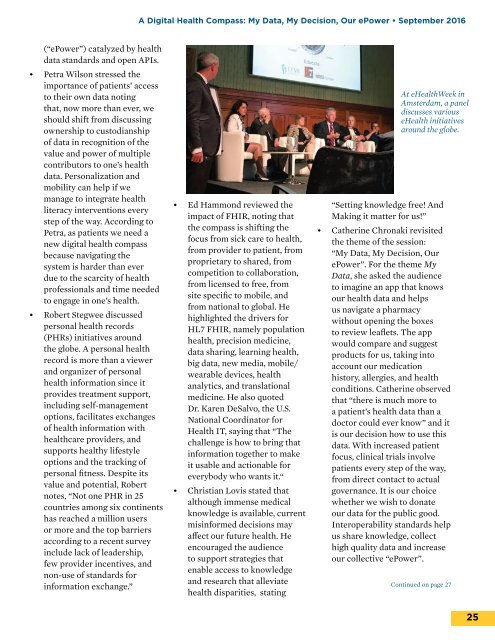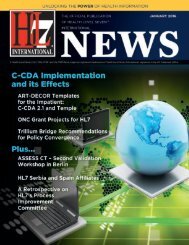In this Issue HL7 News
2cndmS4
2cndmS4
Create successful ePaper yourself
Turn your PDF publications into a flip-book with our unique Google optimized e-Paper software.
A Digital Health Compass: My Data, My Decision, Our ePower • September 2016<br />
(“ePower”) catalyzed by health<br />
data standards and open APIs.<br />
• Petra Wilson stressed the<br />
importance of patients’ access<br />
to their own data noting<br />
that, now more than ever, we<br />
should shift from discussing<br />
ownership to custodianship<br />
of data in recognition of the<br />
value and power of multiple<br />
contributors to one’s health<br />
data. Personalization and<br />
mobility can help if we<br />
manage to integrate health<br />
literacy interventions every<br />
step of the way. According to<br />
Petra, as patients we need a<br />
new digital health compass<br />
because navigating the<br />
system is harder than ever<br />
due to the scarcity of health<br />
professionals and time needed<br />
to engage in one’s health.<br />
• Robert Stegwee discussed<br />
personal health records<br />
(PHRs) initiatives around<br />
the globe. A personal health<br />
record is more than a viewer<br />
and organizer of personal<br />
health information since it<br />
provides treatment support,<br />
including self-management<br />
options, facilitates exchanges<br />
of health information with<br />
healthcare providers, and<br />
supports healthy lifestyle<br />
options and the tracking of<br />
personal fitness. Despite its<br />
value and potential, Robert<br />
notes, “Not one PHR in 25<br />
countries among six continents<br />
has reached a million users<br />
or more and the top barriers<br />
according to a recent survey<br />
include lack of leadership,<br />
few provider incentives, and<br />
non-use of standards for<br />
information exchange.”<br />
• Ed Hammond reviewed the<br />
impact of FHIR, noting that<br />
the compass is shifting the<br />
focus from sick care to health,<br />
from provider to patient, from<br />
proprietary to shared, from<br />
competition to collaboration,<br />
from licensed to free, from<br />
site specific to mobile, and<br />
from national to global. He<br />
highlighted the drivers for<br />
<strong>HL7</strong> FHIR, namely population<br />
health, precision medicine,<br />
data sharing, learning health,<br />
big data, new media, mobile/<br />
wearable devices, health<br />
analytics, and translational<br />
medicine. He also quoted<br />
Dr. Karen DeSalvo, the U.S.<br />
National Coordinator for<br />
Health IT, saying that “The<br />
challenge is how to bring that<br />
information together to make<br />
it usable and actionable for<br />
everybody who wants it.“<br />
• Christian Lovis stated that<br />
although immense medical<br />
knowledge is available, current<br />
misinformed decisions may<br />
affect our future health. He<br />
encouraged the audience<br />
to support strategies that<br />
enable access to knowledge<br />
and research that alleviate<br />
health disparities, stating<br />
At eHealthWeek in<br />
Amsterdam, a panel<br />
discusses various<br />
eHealth initiatives<br />
around the globe.<br />
“Setting knowledge free! And<br />
Making it matter for us!”<br />
• Catherine Chronaki revisited<br />
the theme of the session:<br />
“My Data, My Decision, Our<br />
ePower”. For the theme My<br />
Data, she asked the audience<br />
to imagine an app that knows<br />
our health data and helps<br />
us navigate a pharmacy<br />
without opening the boxes<br />
to review leaflets. The app<br />
would compare and suggest<br />
products for us, taking into<br />
account our medication<br />
history, allergies, and health<br />
conditions. Catherine observed<br />
that “there is much more to<br />
a patient’s health data than a<br />
doctor could ever know” and it<br />
is our decision how to use <strong>this</strong><br />
data. With increased patient<br />
focus, clinical trials involve<br />
patients every step of the way,<br />
from direct contact to actual<br />
governance. It is our choice<br />
whether we wish to donate<br />
our data for the public good.<br />
<strong>In</strong>teroperability standards help<br />
us share knowledge, collect<br />
high quality data and increase<br />
our collective “ePower”.<br />
Continued on page 27<br />
25



